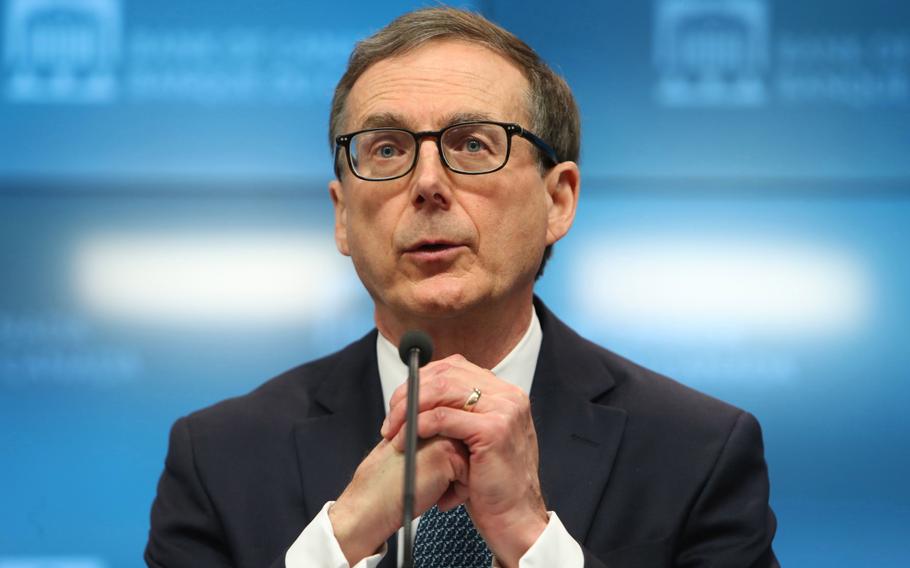
Tiff Macklem, governor of the Bank of Canada, in Ottawa on March 3, 2022. (David Kawai/Bloomberg)
The Bank of Canada hiked interest rates by a full percentage point, a surprise move that supercharges efforts to withdraw stimulus amid fears four-decade-high inflation is becoming entrenched.
Governor Tiff Macklem raised the central bank's policy rate to 2.5% in a decision announced Wednesday in Ottawa that warned of more hikes to come. The 100-basis-point move is the largest increase since 1998. Markets and economists were anticipating 75 basis points.
The unexpected monetary jolt illustrates the extent to which officials are spooked by soaring inflation, electing to take decisive action even at the risk of causing severe economic pain. They cited worries that persistent inflation creates a vicious cycle of wage gains and price increases that makes it difficult to bring inflation under control.
"With the economy clearly in excess demand, inflation high and broadening, and more businesses and consumers expecting high inflation to persist for longer, the Governing Council decided to front-load the path to higher interest rates," officials said in the policy statement.
The Canadian dollar extended gains on the move, rising 0.4% to C$1.2975 per U.S. dollar at 10:35 a.m. in Toronto trading. Yields on two-year sovereign bonds rose 13 basis to 3.336%. Canadian stocks declined, with the S&P/TSX Composite Index falling 1.1%.
Investors ramped up bets that front-loading also means a higher terminal rate for the central bank. Overnight swaps are suggesting Macklem will hike the benchmark to 3.75% by the end of this year, up from 3.5% before today's decision.
To explain the aggressive move, policymakers cited an economy "clearly in excess demand," high and broadening consumer price gains and growing inflation expectations. Officials said they expect to continue raising rates further and will be "resolute" on bringing inflation back to target.
Still, policymakers indicated they believe front-loading rates would actually limit economic damage in the long run, by reducing the need to chase escalating inflation expectations in the future.
In the statement, the bank said "the economic cost of restoring price stability will be higher" if inflation becomes entrenched in wage and price setting expectations.
The 100-basis-point increase follows consecutive half-percentage-point hikes in April and June, making the current tightening effort one of the most aggressive ever. Wednesday's super-sized increase brings rates into the neutral range, where borrowing costs are neither stimulative nor constrictive.
Central banks around the world have pivoted to more aggressive hiking paths as inflation pressures continue to surprise. The Federal Reserve delivered a 75-basis-point hike last month, which probably paved the way for the Bank of Canada to be aggressive in its decision this week.
"The Bank of Canada saw the Fed hike 75 bps and said 'Hold my beer,'" Royce Mendes, head of macro strategy at Desjardins Securities Inc., said in a report to investors.
In the accompanying monetary policy report, officials again raised their near-term forecasts for inflation, seeing price pressures running at around 8% in the middle quarters of this year. Inflation will drop to 7.5% by the end of this year, and won't return to the 2% target until the end of 2024.
Policymakers also slashed their outlook for the Canadian economy. They now see gross domestic product expanding 3.5% this year and 1.8% in 2023, down from 4.2% and 3.2% respectively, as global growth moderates and tighter monetary policy impacts activity.
The bank added analysis of a new risk scenario, in which a "self-reinforcing wage hike and price spiral" could ensue, saying that situation becomes more likely the longer inflation remains "well above" their 2% target.
In an appendix to the report, the bank acknowledged mistakes in forecasting inflation over the last year. It primarily blamed the errors on global factors, but also cited domestic housing costs.
The bank said real-estate activity has already weakened substantially from what it described as an "unsustainable pace" during the pandemic. It expects both housing transactions and prices to decline into 2023 as rates rise.
___
Bloomberg's Randy Thanthong-Knight contributed to this report.